|
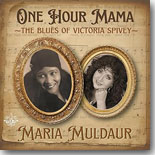 Legendary
'20s and '30s blues singer Victoria Spivey took
a young up-and-coming vocalist named Maria
D'Amato under her wing when the youngster was
breaking into the music world in the early '60s.
Ms. D'Amato became close to her mentor and
learned a lot from her, eventually becoming
known as Maria Muldaur and enjoying much
success of her own over the past 60 years. Legendary
'20s and '30s blues singer Victoria Spivey took
a young up-and-coming vocalist named Maria
D'Amato under her wing when the youngster was
breaking into the music world in the early '60s.
Ms. D'Amato became close to her mentor and
learned a lot from her, eventually becoming
known as Maria Muldaur and enjoying much
success of her own over the past 60 years.
Her
track record includes six Grammy nominations,
numerous blues awards and The Lifetime
Achievement Americana Trailblazer Award, plus a
monster pop hit in 1973 (“Midnight At The
Oasis”) that is still frequently heard on the
radio.
Muldaur has paid tribute to several women
artists over the years, so it only makes sense
that she honors Spivey, based on their personal
relationship. One Hour Mama – The Blues of
Victoria Spivey (Nola Blue Records) offers
12 Spivey classics lovingly rendered by Muldaur.
Three of the tracks come from an earlier Muldaur
tribute album for Stony Plain Records,
Naughty, Bawdy and Blue, featuring James
Dapogny's Chicago Jazz Band in support. Two of
the tracks feature Muldaur backed by Tuba
Skinny, the New Orleans band who collaborated
with her on her last release. The remaining
tracks find Muldaur supported by a five-piece
group (see below) with guests Elvin Bishop, Taj
Mahal, and Chris Burns.
The tracks Muldaur recorded with the Chicago
Jazz Band include the opening track, the lusty
“My Handy Man,' the sassy title track, and the
closing track, “TB Blues.” Muldaur's sultry
delivery is a seamless fit with the bawdy
lyrics, and the band provides a swinging
backdrop in support that touches on blues and
jazz, venturing toward a New Orleans feel.
That
Crescent City vibe recurs on the two tracks with
Tuba Skinny (“Organ Grinder Blues” and “Funny
Feathers”), which recall the good-natured fun of
their 2021 release, Let's Get Happy Together,
and Muldaur is obviously enjoying the material.
The
remaining tracks find Muldaur backed by a
five-piece band that includes Danny Caron on
guitar, Johnny Bones on saxophone, Neil Fontano
or David K. Matthews on piano, and Beaumont
Beaullieu on drums. These tracks include
appearances by Elvin Bishop who playfully duets
with Muldaur on “What Makes You Act Like That?”
and Taj Mahal, who has a good time on “Gotta
Have What It Takes.”
The
remainder of these tunes include “Don't Love No
Married Man,” “Dreaming of You,” “No Papa No!,”
“Any-Kind-Of-Man,” and “Down Hill Pull.” These
numbers are a bit more laid back in their
delivery, but, as on the other tracks, Muldaur's
vocals are front and center and really don't
need much embellishment.
Sadly, many blues fans are not familiar with
Victoria Spivey, which is a genuine shame
because if ever a lady was ahead of her time in
the blues world, she would certainly qualify.
Maria Muldaur has always acknowledged her roots
and influences, and Ms. Spivey was one of her
most influential mentors. One Hour Mama – The
Blues of Victoria Spivey will hopefully
spotlight the talents of both singers and lead
listeners to dig deeper with both artists.
--- Graham Clarke
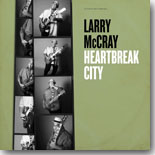 Larry
McCray has been on the blues scene for quite
a while, with albums being released on a variety
of blues labels. For his last couple of
releases, he's aligned with Joe Bonamassa's
nonprofit Keeping The Blues Alive label, a
partnership that's resulted in some good stuff
from the veteran blues guitarist. Larry
McCray has been on the blues scene for quite
a while, with albums being released on a variety
of blues labels. For his last couple of
releases, he's aligned with Joe Bonamassa's
nonprofit Keeping The Blues Alive label, a
partnership that's resulted in some good stuff
from the veteran blues guitarist.
The latest from
McCray, Heartbreak City, just might be
his best yet. Co-produced by Bonamassa and Josh
Smith, this is a consistently solid album of 11
cuts, with nary a mediocre song among the mix.
Bonamassa and Smith
are both credited with guitar parts throughout
the album, so it's hard to tell who's providing
the solos, but let's assume that McCray is
laying down some incendiary guitar licks
throughout. In addition to his guitar work, we
hear McCray's rich vocals on every cut.
McCray opens with an
important lesson to all male listeners on the
up-tempo, funky blues, "Try To Be A Good Man,"
his handbook on how to treat your woman right.
The title cut is a slow blues that allows McCray
plenty of time to show the pain in his voice
over snaky guitar accompaniment. Like on most
songs, we get wonderful backing vocals from the
vastly underrated Jade MacRae and Danielle De
Andrea, as well as keyboards from Reese Wynans.
One of the singles,
"Bye Bye Blues," starts with a subtle intro to
this pleasant soul/blues, with the background
singers and the Sunset Sound horns later adding
so much to the song. Southern California
guitarist Kirk Fletcher joins the band with
tasteful rhythm guitar. The other single,
"Bright Side," is a mid-tempo blues with plenty
of emotion coming from McCray's voice as he
persistently asks how many times a man's heart
can be broken.
The vibe gets funky
and soulful on "Everything Falls On Me," before
McCray admits to his faults in a previous
relationship on the slow blues, "I Know What
I've Done." With Fletcher back in the studio, we
hear some of the best guitar work on the 12-bar
blues, "Keep On Loving My Baby," with Wynans
adding strong piano accompaniment.
"Hangman" takes it
to church with limited instrumentation, focusing
McCray's vocals over top of a hypnotic rhythm
driven by the drumming of Calvin Turner. The
vocals are front and center again on the slow
blues, "Stop Your Crying," as McCray pleads with
his woman to stay with him. He tells her that if
he can't make it with her, he can't be with
anyone else.
The mid-tempo funky
blues, "Crazy World," has McCray reflecting on
how everything seems to be backwards in our
current lives, with some innovative guitar licks
throughout. McCray then goes into a country
sound on the closing song, "Drifting And
Drifting," with slide guitar mixing in a blues
mood.
Heartbreak City
will hopefully bring McCray some recognition at
awards time, as it's a worthy collection of
solid blues tunes.
Not to be overlooked
are the contributions that Bonamassa is making
in promoting blues artists who need a boost, and
not just McCray. Paying it forward in a manner
of speaking.
--- Bill Mitchell
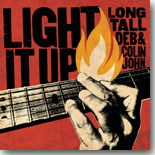 The
latest album by Long Tall Deb & Colin John,
Light It Up (VizzTone), was initially
previewed by the early news of an upcoming
release of the album's first single, a version
of Annie Lennox's major Eurythmics hit, "Sweet
Dreams." That news had me eagerly anticipating
the single to see what Deb and Colin would do
with Lennox's soulful original. The
latest album by Long Tall Deb & Colin John,
Light It Up (VizzTone), was initially
previewed by the early news of an upcoming
release of the album's first single, a version
of Annie Lennox's major Eurythmics hit, "Sweet
Dreams." That news had me eagerly anticipating
the single to see what Deb and Colin would do
with Lennox's soulful original.
I
had heard plenty of other covers of "Sweet
Dreams" before, most notably the New Orleans
brass band version of "Sweet Dreams" by The Soul
Rebels Brass Band that turned me on to those
Crescent City cats, and I even dug the movie
version by Maria Bello from the 2000 guilty
pleasure flick, Duets.
Long
Tall Deb's version is great, as John's guitar
playing turns it into a Texas blues shuffle.
Jennifer Milligan adds a touch more soul with
her background vocals, kind of like an extra
layer of icing on top of an already sinfully
good layer cake.
The
other cover here is a much heavier version of
Willie Dixon's "Spoonful," a cacophony of
sounds, at times dissonant, but still something
I think Dixon would enjoy hearing. Steve
Marriner sits in with the band on harmonica,
keeping a Chicago blues sound imbedded in the
song.
As
for the rest of the album, each number is
written by Deb with co-writership credits going
to co-producer Chris Butler, formerly of The
Waitresses back in the 1980s. Many of the
original songs delve into political and societal
topics, with Deb's leanings to the left clearly
on display.
Deb's concern about the state of the nation
shows up right away on the opener, "Light It
Up," an up-tempo blues rocker on which she
encourages a new kind of fire, emphasizing
freedom over fear, people over profits, and
eliminating hunger, greed, and misinformation,
among other hopes. A pair of notable guitarists,
Alastair Greene and Pascal Fouquet, make their
first appearance on this cut.
Another heavy blues/rock, "My Love," has Deb
explaining how to earn her love, singing, "...
fire can only burn when it can breathe, you've
got to give the love you want to receive ..."
Returning to the political environment on
"Lessons In The Ground," Deb reminds that we've
got to remember the lessons we learned in the
past (i.e. the Civil War, the 1960s marches for
freedom) so that we don't fight against each
other again.
"Hear Them Moan" starts with very quiet drumming
before Deb comes in to explain her changing
religious beliefs, questioning the faith that
was taught to her when she was young. Nice slide
guitar work from John over polyrhythmic drumming
gives the song a spooky vibe.
"Deflection Blues" holds nothing back, starting
first with nothing but Deb's pleasnat voice
before the rest of the band comes in laying down
plenty of blues/rock sounds. Her message is that
a fascist's game plan is to divide and conquer,
creating distractions from simple truths,
calling out "fake news," using weapons not
approved for war against you and me, and more.
We know who she's singing about here ... no
question about it. All of this comes over a
heavy slide guitar sound.
"Black Light Wolf" opens with Deb's howling, as
she sings about a black light wolf whose eyes
follow her all around the room. There's a hidden
message here, so your challenge is to figure out
the meaning. Greene and Fouquet return to
exchange guitar licks on the up-tempo blues
instrumental, "Out For A Rip." It drives us hard
for three minutes and 20 seconds.
Bringing Light It Up to an end is a much
quieter number, "Crooks, Thieves, And Liars," a
subtle song of hope with a message for what we
as a society will overcome. In her gentlest
voice, she calls out embittered bigots with
QAnon dreams, and that we will send them back
into the shadows.
Some
very powerful messages coming at us in Light
It Up, showing that life is more than just
sweet dreams. Sometimes we've got to be reminded
that we are living in dangerous times in a
pretty screwed up society. Deb and Colin have us
wading us into both sides of the pool of
emotions, making for a very important album.
--- Bill Mitchell
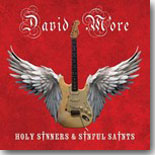 Ten
years ago, Argentinian blues rocker David
M'ore last release, the powerful Passion,
Soul & Fire, was well-received by fans of
blues rock. His latest release, Holy Sinners
& Sinful Saints, finds the singer/guitarist
keeping the fires hot, with 12 tracks and
backing from his stalwart rhythm section (Wade
Olson – drums, Marshall St. Clair – bass). Two
of the tracks are covers of sorts, put together
more to pay tribute to M'ore's influences than
to serve as replications of the original tunes. Ten
years ago, Argentinian blues rocker David
M'ore last release, the powerful Passion,
Soul & Fire, was well-received by fans of
blues rock. His latest release, Holy Sinners
& Sinful Saints, finds the singer/guitarist
keeping the fires hot, with 12 tracks and
backing from his stalwart rhythm section (Wade
Olson – drums, Marshall St. Clair – bass). Two
of the tracks are covers of sorts, put together
more to pay tribute to M'ore's influences than
to serve as replications of the original tunes.
Opening the disc is “Me And My Baby,” a gritty
blues rocker highlighted by M'ore's gravelly
vocal and his soaring guitar work. “Rock Me” is
a re-imagining of the B.B. King classic, with
robust guitar and vocals, and the intriguing
title track features M'ore on resonator and
wah-wah pedal as he mixes in other sound effects
to give the song a haunting atmosphere.
“Let
Me Take You Home” is a rocking ballad with a
'70s feel, and “Bleeding Heart” is an excellent,
mid-tempo instrumental that gives M'ore ample
space to display his guitar chops.
The
muscular rocker “It's Alright” features more
soaring fretwork and M'ore's growling vocals,
while “Love Is” is another old-school rock
ballad, the guitar and vocals giving this track
an '80s metal vibe. “Let's Get Together” adds a
bit of funk to the rock and blues, and “Hoochie
Man” is a variation of the Muddy Waters
standard, altering the lyrics somewhat over a
droning, nearly Hill Country rhythm and grungy
guitar work.
“Armenia” adds spooky Eastern percussions and
overdubbed vocals, proving that regardless of
where in the world the blues originates, it's
still the blues. “Still In Love With You” is a
nice slow blues reminiscent of early Santana
with M'ore's fretwork, and “Insanity” is a
crunching rocker with a memorable riff..
Closing the disc is “Money And Trouble,” which
plays it closer to contemporary blues, wrapping
the album most effectively.
David M'ore's brand of blues will certainly
appeal to blues fans who dig a healthy dose of
rock in their mix, with a few dashes of metal
thrown in for good measure. Holy Sinners &
Sinful Saints continues the musical
traditions forged by many of the American and
British blues rockers of the '60s and '70s that
still appeal to fans today.
--- Graham Clarke
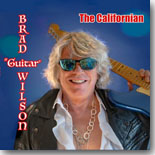 Brad
“Guitar” Wilson has toured with Chicago,
opened for Buddy Guy, Cheap Trick, .38 Special,
the Marshall Tucker Band, and Tommy Castro,
among others. He's also written songs for TV and
film. The Carmel, California native is also a
blues rocker of some note, having released
several fine albums over the years. His latest
release, on Cali Bee Music, is The
Californian, a 14-song set with eight
originals and four interesting cover selections. Brad
“Guitar” Wilson has toured with Chicago,
opened for Buddy Guy, Cheap Trick, .38 Special,
the Marshall Tucker Band, and Tommy Castro,
among others. He's also written songs for TV and
film. The Carmel, California native is also a
blues rocker of some note, having released
several fine albums over the years. His latest
release, on Cali Bee Music, is The
Californian, a 14-song set with eight
originals and four interesting cover selections.
Opening the set is a high energy cover of Tampa
Red's immortal “It Hurts Me Too.” Wilson's
vocals are powerful and so is his fretwork. Next
are a pair of Wilson originals, the meaty
shuffle “Lightning In A Bottle” and “Say You
Wanna Dance,” a lively rocker that will get
listeners on their feet.
Wilson's well-done cover of the Rolling Stones'
“Dead Flowers” retains the country rock feel of
the original, and the muscular rocker “Monterey”
pays tribute to the California city.
“Heartbreaker” is a gritty blues rocker driven
by a crunchy guitar riff, and the cover of the
late Mick Ralphs' (via Mott The Hoople) “Ready
For Love” features a soulful vocal from Wilson.
The Wilson original “Back Roads” is a catchy
tune about traveling down those
off-the-beaten-path roads, with a crisp guitar
break at the mid-point. The Eddie Cochran rock
n' roller “Summertime Blues” is a fun cover that
leads to the fine Wilson-penned ballad “Goin'
Home.”
“I
Work Alone” is a look at the truck driving
profession, reflecting on the long hours and
lonely times involved. “Love And Peace” is an
instrumental written by Arthur Adams and
recorded by the Jazz Crusaders in the late '60s,
showing Wilson knows his way around the jazz
genre as well as he provides superb guitar on
this track.
The
“Teaser” reprises one of the tracks Wilson wrote
for a movie soundtrack (in this case, 1998's
John Carpenter film Vampires) and it's a
powerful rocker. The album closes with an
outstanding cover of Willie Dixon's “Groaning
The Blues,” with a masterful performance from
Wilson and the band.
Among the musicians contributing to these tracks
are drummers Toto Poznantek and Tony Braungel,
keyboardists Chris Rhyme, Luca Catalfamo, and
Frankie Virens, bassists Hal Cragin, Brian Beal,
and Fabrizo Erba, with Maria K on harmonica, and
Leanna Baxter, Francis Buckley, and Galen Keith
on background vocals.
The Californian is another winner for Brad
“Guitar” Wilson, who continues to be one of the
go-to voices and guitars for blues rock fans,
thanks to his songwriting, musicianship, and
fresh takes on classic blues and rock material.
--- Graham Clarke
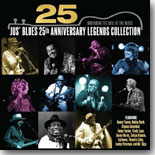 The
Jus' Blues Music Foundation may not be as
well-known as The Blues Foundation, but the work
they have been doing for the past 25 years to
support and promote blues is just as important.
To commemorate their silver jubilee, the folks
running this organization have released a
compilation of key artists, Jus' Blues 25th
Anniversary Legends Collection. It's
available in digital format and limited-edition
gold vinyl LP. The
Jus' Blues Music Foundation may not be as
well-known as The Blues Foundation, but the work
they have been doing for the past 25 years to
support and promote blues is just as important.
To commemorate their silver jubilee, the folks
running this organization have released a
compilation of key artists, Jus' Blues 25th
Anniversary Legends Collection. It's
available in digital format and limited-edition
gold vinyl LP.
There's a wide range of artists on the album's
11 cuts, some numbers that we've heard before
and others that were either previously
unreleased or recorded just for this collection.
We
begin with Houston-based singer Diunna
Greenleaf, hearing her big voice on "Sunny Day
Friends," originally appearing on her 2022
Little Village I Ain't Playin' album. As
expected, her powerful vocals and Kid Andersen's
smokin' guitar licks dominate the song. We then
head to the Mississippi Delta via Detroit for an
outstanding raw Delta blues, "Stranded In
Clarksdale," from Jimmy Burns, courtesy of his
2003 Delmark album.
Zakiya Hooker pays tribute to her late father,
the legendary John Lee Hooker, on "Bluesman's
Journey," a single she released in 2023.
We even get a few snippets of John Lee's voice
interspersed with Zakiya's tales of her father
on this up-tempo blues shuffle. That song pairs
well with Benny Turner's "Who Sang It First,"
from his 2024 Nola Blues album, on which he
mentions many of the early blues pioneers during
the course of this slow, gospel-sounding blues.
"Turning the Same Ole Corners" is a
previously-unreleased soul/blues from Trudy
Lynn, and hearing just a few seconds of this
song will have you wondering why it hasn't seen
the light of day before this. But if it
introduces Ms. Lynn to some new listeners,
mission accomplished. "Garbage Man," from Bobby
Rush, was recorded just for this album,
featuring the unaccompanied Bobby on vocals and
harmonica. It's obvious that this was a home
recording, but the lesser sound quality doesn't
take away from the beauty of the song.
It's
obvious that I haven't listened to enough
Theodis Ealey in my blues lifetime, prompting me
to start digging through my racks of CDs to get
caught up on his discography. The B.B. King
influence certainly shows on a live version of
"Blues is Calling My Name," with a nice horn
section backing his smooth vocals and guitar
playing. Another performer that I've overlooked
too often is Teeny Tucker, with her soulful
vocals on the mid-tempo "Ain't That the Blues"
being one of the gems here, coming to us from
the 2010 album Keep The Blues Alive.
A
deep south blues/soul legend is Latimore, with
his "Let's Straighten It Out" an iconic song in
the genre. We don't get the original here, but
instead a version cut just for this album. Not
the best sound quality, but the dude can still
sing. Another unreleased number is Mr. Sipp's
up-tempo soul/blues number, "Hold It in the
Road." It moves along quickly with a driving
rhythm that suits Mr. Sipp's soulful voice.
Our
closer is an unreleased gospel mover from Lucky
Peterson, "See My Way God," with funky effects
added. It ends the album on a happy beat.
Hoping this album encourages listeners to seek
out other stuff from these 11 important artists.
Thanks to Jus' Blues Music Foundation for
everything they do. Please support these folks
by adding this enjoyable album to your
collection.
--- Bill Mitchell
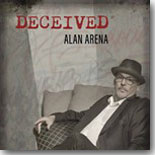 Alan
Arena has been writing songs since the late
'70s and had two Top Ten New England albums when
he relocated to care for his best friend, a
veteran who was suffering from Huntington's
Disease. He figured performing was a thing of
the past for him until a studio and venue called
The Music Room opened on Cape Cod and he met
Grammy winner Paul Nelson, who played with
Johnny Winter for 14 years and was a partner in
the venue. Nelson heard some of Arena's songs
and he offered to produce his next album,
collaborating on some of the songs with Arena. Alan
Arena has been writing songs since the late
'70s and had two Top Ten New England albums when
he relocated to care for his best friend, a
veteran who was suffering from Huntington's
Disease. He figured performing was a thing of
the past for him until a studio and venue called
The Music Room opened on Cape Cod and he met
Grammy winner Paul Nelson, who played with
Johnny Winter for 14 years and was a partner in
the venue. Nelson heard some of Arena's songs
and he offered to produce his next album,
collaborating on some of the songs with Arena.
That
album, Deceived, features eight songs
(two are present as a “radio edit” and an
instrumental version). Arena handles vocals and
guitar, and Winter plays guitar, as well as
producing the album, bringing in a great rhythm
section that includes Brad Hallen (bass), Marty
Richards (drums), Brooks Milgate (piano/organ),
and Stephen Clements (percussion), along with
vocalists Allyssa Jones, Jamie Brown, and Joe
Russo, harp master Jerry Portnoy on one tune,
and “Sax” Gordon Beadle on two tracks.
The
opening track, “Raised On Radio,” finds Arena
recalling his early days listening to songs of
various genres on his radio, culminating in
southern blues and soul. The track has a gritty
rocking feel with Nelson's guitar leading the
way.
The
inspiring “Believing In Yourself” mixes a bit of
soul and gospel with Arena's heartfelt vocal
driving the track. The Latin-flavored title
track, co-written by Arena and Nelson, is a
tense track addressing betrayal in a
relationship. “Big Black Cat” is a lively blues
rocker with sparkling guitar work from Nelson.
“Devil In The Bottle” is a funky blues that
seeps down in your bones (great work from the
rhythm section on this track), and Arena and
company deliver a masterful cover of Memphis
Slim's “Mother Earth,” with Portnoy contributing
harp to go with Arena's soulful vocal.
The
fast-paced “Speed of Life” is a rock-edged blues
with terrific guitar, organ, piano, and a
driving rhythm. “Hypnotized” maintains the brisk
pace, adding Beadle's saxophone to the mix,
along with backing vocals and rollicking
keyboards and guitar.
The
album closes with a nice radio edit version of
“Believe In Yourself” and an instrumental
version of the title track, which plugs in
Beadle on sax, giving the song an even edgier
tone.
I am
certainly glad that Alan Arena had the
opportunity to get into the studio again.
Deceived is a fine, well-crafted set of
blues and soul tunes. Sadly, there will not be a
second Arena/Nelson collaboration since Nelson
passed away in early 2024, but fortunately blues
fans have the chance to hear them together one
time with this great effort.
--- Graham Clarke
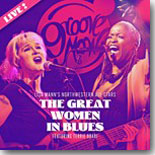 Patrick
Kaiser has been assembling premier blues artists
to perform at the Groove Now concert series, a
world-renowned concert series held in Basel,
Switzerland since 2010. For the 2023 series, he
invited bassist/vocalist Lisa Mann, two-time BMA
nominee and BMA winning drummer Jimi Bott to put
together a Pacific Northwest supergroup, which
included guitarists Ben Rice and Jason “JT”
Thomas, and B3 master Louis “King Louie” Pain,
forming Lisa Mann's Northwestern All-Stars. Patrick
Kaiser has been assembling premier blues artists
to perform at the Groove Now concert series, a
world-renowned concert series held in Basel,
Switzerland since 2010. For the 2023 series, he
invited bassist/vocalist Lisa Mann, two-time BMA
nominee and BMA winning drummer Jimi Bott to put
together a Pacific Northwest supergroup, which
included guitarists Ben Rice and Jason “JT”
Thomas, and B3 master Louis “King Louie” Pain,
forming Lisa Mann's Northwestern All-Stars.
Kaiser requested that the band include a tribute
to the great women of the blues as part of one
of their three nights of shows, so Mann invited
singer Terrie Odabi, another multiple BMA
nominee, to join the group, providing a voice
that would be representative of the history of
the music.
Recorded live at the historic Atlantis Club in
Basel and mixed by Bott himself, the impressive
performance can now be heard by blues fans all
over via the JayRay Records release, The
Great Women In Blues, which includes 11
masterful performances of blues classics
associated with the lady legends of the genre.
Odabi begins the set with a capella readings of
“Wade In The Water” and “Swing Low Sweet
Chariot” as she explains the origin of the
blues. The band kicks in behind her on the Etta
James number “I Sing The Blues,” written by Earl
Bridgeman and Philip Wootten. Odabi drops in a
line or two from the Koko Taylor classic “Wang
Dang Doodle” during this rollicking tune.
Mann
sings on the powerful “I Don't Hurt Anymore,” a
hit in the late '60s by Dinah Washington,
showcasing nice guitar interplay and keyboards
from King Louie. The Staples Singers' “Why? (Am
I Treated So Bad)” opens with a short
instrumental run, with robust guitar work from
Rice, leading into a superb vocal from Odabi.
Sister Rosetta Tharpe's “That's All” follows, an
excellent version with another strong Mann
vocal, and Koko Taylor's “Let The Juke Joint
Jump” (written by Vasti Jackson) finds Odabi
getting the audience involved in the performance
after a bit of encouragement and persuasion.
Next is Ruth Brown's “5-10-15 Hours,” composed
by Rudolph Toombs and playfully sung by Mann,
who adds nasty bass with great fretwork from
Thomas.
The
Big Mama Thornton standard “Ball and Chain” is a
wonderful slow burner with a marvelous vocal
from Odabi and extraordinary guitar work from
Thomas throughout the track. Mann takes the next
two vocals – a swinging take of Big Maybelle's
(via Rose Marie McCoy and Leroy Kirkland) “So
Good To My Baby,” and a supremely soulful
version of the Etta James song “I'd Rather Go
Blind.”
The
album wraps with an extended, enthusiastic
version of “Wang Dang Doodle,” referred to at
the beginning of the set, with more audience
participation.
Mann
and Odabi are both outstanding on these tunes,
and the band is phenomenal throughout. The
Great Women In Blues is a rock-solid set
from start to finish, and will satisfy blues,
soul, and roots music fans and possibly send
them out in search of the original performers of
these classic songs.
--- Graham Clarke
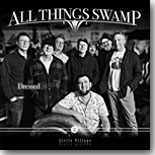 The
California-based group All Things Swamp
consists of musicians from a diverse group of
bands who gather on their days off to play the
music of New Orleans for their own pleasure.
These musicians are led by tuba player Luke
Kirley, a mainstay of the Bay Area salsa scene.
The remainder of the band includes session giant
Dean Parks (tenor sax/guitar), San Jose State
Director of Jazz Studies Aaron Lington,
America's Got Talent finalist Tim
Hockenberry (vocals/keys/trombone), restaurateur
Dan Gordon (trombone), jazz educator Brian
Switzer (trumpet), session musician Gary Novak
(drums), Dillon O'Brian, writer of the theme
song to The Office (piano/vocals), and Little
Village Foundation chief Jim Pugh (B3). The
California-based group All Things Swamp
consists of musicians from a diverse group of
bands who gather on their days off to play the
music of New Orleans for their own pleasure.
These musicians are led by tuba player Luke
Kirley, a mainstay of the Bay Area salsa scene.
The remainder of the band includes session giant
Dean Parks (tenor sax/guitar), San Jose State
Director of Jazz Studies Aaron Lington,
America's Got Talent finalist Tim
Hockenberry (vocals/keys/trombone), restaurateur
Dan Gordon (trombone), jazz educator Brian
Switzer (trumpet), session musician Gary Novak
(drums), Dillon O'Brian, writer of the theme
song to The Office (piano/vocals), and Little
Village Foundation chief Jim Pugh (B3).
Their debut release, hopefully the first of
many, is Dressed (Little Village
Foundation). The spiffy opening track, “Sidewalk
Strut,” is driven by Kirley's tuba, in lieu of a
bass guitar, and he takes a deep-down solo on
this track, which also features a tasty New
Orleans backbeat from Novak.
“Bah
Duey Duey,” originally from Big Sam's Funky
Nation, dives deep into the funk with superb
work from the horns, as well as crisp fretwork
from Parks and B3 from Pugh. “Dancing Machine”
was a mid '70s hit for the Jackson 5 (Parks
played guitar on the original), and the group
gives this tune a nice second line groove that
fits the song perfectly.
Joe
Zawinul's “Mercy Mercy Mercy” is associated with
Cannonball Adderley's hit version from the mid
'60s, with the band retaining the original's
irresistible melody while adding a dash of funk
to the mix. This is New Orleans music, of
course.
There's also a terrific cover of Hoagy
Carmichael's “Rocking Chair,” featuring a
marvelous vocal from Hockenberry that's right
out of the Crescent City. “Blues For Ben” jumps
right back into the funk, as Hockenberry shines
on his trombone solo, as does Switzer on
trumpet, and Kirtley on tuba (the secret weapon
of the disc).
O'Brian provides vocals on the great cover of
Robert Palmer's “How Much Fun,” a track taken
from the British vocalist's wonderful debut
album in 1974, which served as a tribute of New
Orleans music itself. The closer is a raucous
read of the Rebirth Brass Band's “Take It To The
Streets,” which wraps the album up about as well
as it could possibly be done.
Though these musicians come from a variety of
musical backgrounds, they all come together for
the wonderful music of New Orleans, and they do
it with style.
Dressed is a fantastic set that will drop
listeners right in the middle of the Crescent
City, no matter where they are. If you're a fan
of New Orleans music of any kind, you need this
set from All Things Swamp in your collection.
--- Graham Clarke
 Eric
Wilson Adams got his musical start in South
Dakota, singing in a rock band at the age of 14,
later forming the band Cocoon with four of his
high school buddies. The band played all over
the state at many locations, continuing through
high school and college throughout the Midwest
in their monster green, converted school bus. Eric
Wilson Adams got his musical start in South
Dakota, singing in a rock band at the age of 14,
later forming the band Cocoon with four of his
high school buddies. The band played all over
the state at many locations, continuing through
high school and college throughout the Midwest
in their monster green, converted school bus.
The
band was inducted into the South Dakota Rock
Hall of Fame in 2018. Relocating to Texas a few
years back, Adams began writing his own songs,
and his latest release, Losing Ground, is
a fine display of his songwriting and
performing, a mix of blues, rock, and country.
The
title track opens the disc, sort of a country
blues with slide guitar, about the end of a
relationship, a track that shows the song themes
of blues and country are similar. Adams has a
good, solid voice with a vulnerability that
reflects well in either genre.
The
gritty rocker, “I Have Lived,” finds Adams
recalling things that happened in his past. “All
Alone Tonight” is a mid-tempo country track with
fiddles and steel guitar, and a jaunty rhythm
that belies the subject matter, while “A Time I
Had” is an upbeat rock track.
“Says She Loves Me Just The Same” is a bluesy
ballad, and “Make A New Memory” is a lively
dance track, while the high-energy “Rock Partay”
is just that. Meanwhile, “Destination” is an
upbeat slice of Americana that will get feet to
moving, and “Stronger Man” is a splendid blues
track with nice work on the keyboards (sorry, no
track information, so not sure who's playing
what, though it's all really well done).
“Wicked Old Time” and “Play'n That Love Song”
have the feel of classic southern rock in the
tradition of The Amazing Rhythm Aces.The closer,
“Star Country,” is a strong country rocker
paying tribute to the working class folks who
work hard and play hard.
As
stated above, Losing Ground, is a mix of
blues, rock, and country.....mostly country.
However, it shows that there's not a lot of
difference in those styles of music as far as
themes and topics go.
Eric
Wilson Adams is a fine songwriter and singer,
and the musical support is first-rate,. If you
are a fan of any of those genres, give this set
a spin and you will hear something you like.
--- Graham Clarke
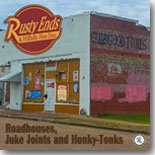 Rusty
Ends has a most fascinating back story.
Raised in Kentucky, he started playing on the
Dixie Highway between Louisville and Fort Knox
in the bars and taverns along that stretch of
highway. The band had to play a variety of
styles to entertain the soldiers, bikers,
laborers, hustlers, and working ladies, and that
variety included blues, soul, country, and rock
n' roll. He soon joined The Premiers, a popular
band on the Louisville scene, and made his first
recording with the band Cooper 'n' Brass at
Phillips International Recording Studio in 1969. Rusty
Ends has a most fascinating back story.
Raised in Kentucky, he started playing on the
Dixie Highway between Louisville and Fort Knox
in the bars and taverns along that stretch of
highway. The band had to play a variety of
styles to entertain the soldiers, bikers,
laborers, hustlers, and working ladies, and that
variety included blues, soul, country, and rock
n' roll. He soon joined The Premiers, a popular
band on the Louisville scene, and made his first
recording with the band Cooper 'n' Brass at
Phillips International Recording Studio in 1969.
He
began focusing on the blues in the early '90s
and was a founding member of the Rusty Spoon
Blues Band. He also began working on his
songwriting. Over the years, he's backed The
Shirelles, The Drifters, Dobie Gray, Bobby
Lewis, The Coasters, and The Marvelettes, and
has played at blues festivals on bills with Koko
Taylor and Otis Rush. He also recorded with
Kelly Richey, Eddie Kirkland, Robbie Bartlett,
and Wayne Young.
After a brief hiatus in the early 2010's, he
returned to playing the blues and packaged it
with rockabilly, soul, gospel, and anything else
that captured his fancy. Ends' latest release,
with the band Hillbilly HooDoo, is
Roadhouses, Juke Joints and Honky Tonks
(Earwig Music). Ends (vocals/guitar) is joined
by Dave Zirnheld (vocals/bass), Gene Wickliffe
(drums), Roosevelt Purifoy (keyboards), and
Wayne Young (guitar on four tracks). Ends and
the band wrote 11 of the 15 tracks.
The
mid-tempo opening track locks into a cool
groove, finding Ends totally into the sound of
his guitar and how playing makes him feel “Bad
Like Billy The Kid.” “The Same Thing” picks up
the pace a bit as Ends states that wherever you
are, the blues is there with you in some way,
shape, or form, thanks to its universal appeal.
“Honky Tonk Man,” recorded by Lonnie Mack in the
late '80s, gets a rollicking roadhouse
treatment, complete with piano from Purifoy and
enthusiastic vocal from Ends. “Lost In The
Blues” is a sentimental old school ballad with a
nice vocal turn and guitar from Ends, while
“Rockabilly Train” is an upbeat rocker that
should send folks to the dance floor.
“Angels Sing The Blues” is another slow burner
that encourages us to be thankful for what we
have. The stirring cover of Betty James' “A
Little Mixed Up” is sung by Zirnheld, and “The
Worm's Turned” is a raucous rocker with a surf
guitar break.
“Midnight Screams” is a slow blues highlighted
by Ends' emotional vocal and his “weeping”
guitar. It's followed by a terrific cover of Ray
Sharpe's “Linda Lu,” and another ballad, “Lie To
Me,” with a vintage rock n' roll feel.
“Thing Called Love” is a funky blues rocker sung
by Zirnheld, and the autobiographical “When A
Geezer Plays The Blues” is a lot of fun and
should appeal to both artists and fans who've
been around for more than a few.
“Bourbon Moon” is an instrumental in the
“Sleepwalk” tradition. The closer is Willie
Nelson's “Night Life,” with the band managing to
capture equal parts of the Nelson and B.B. King
versions.
As
the album title indicates, Rusty Ends &
Hillbilly HooDoo cover all of the musical bases
for blues fans with Roadhouses, Juke Joints
and Honky Tonks. It's a very enjoyable
listen, and the blues world is fortunate that
Rusty Ends found his way back to the music he
loves.
--- Graham Clarke
 The
Arizona-based blues rock band Teskey
(Brandon Teskey – guitar/vocals, Matt Baldwin –
bass, Peter Murphy – keyboards, Brandon Gaddy –
drums) recently released their debut effort,
White Wolf. Founded just last year, the band
has composed 11 original songs that cover a wide
range of blues-related theme within a high
energy fusion of blues and rock. The
Arizona-based blues rock band Teskey
(Brandon Teskey – guitar/vocals, Matt Baldwin –
bass, Peter Murphy – keyboards, Brandon Gaddy –
drums) recently released their debut effort,
White Wolf. Founded just last year, the band
has composed 11 original songs that cover a wide
range of blues-related theme within a high
energy fusion of blues and rock.
On
the opening track, “Under The Sun,” the emphasis
is on the “rock” side of blues rock, with a
catchy opening riff, followed by Teskey's
scorching guitar solo and vocals. “Cast Aside
Child” is only slightly less intense, mixing in
a bit of funk in the rhythm and guitar work.
“Upside Down World” is a slow blues that really
gives Teskey room to stretch out on guitar, and
he certainly satisfies on this track, both
vocally and on guitar (“Under The Sun” and
“Upside Down World” were previously released as
singles).
“Don't Take My Angel” is another slow burner, a
darker song describing the potential loss of a
loved one. Teskey's vocal is mournful and
pleading, as is his guitar playing on this
somber track. “Lemon Tree” is a laid back,
acoustic walking blues that provides a bit of a
break from the intensity generated thus far, as
Teskey proves to be a nimble acoustic guitarist.
The
title track is a moody and atmospheric blues
rocker, and “Digital Window” is an instrumental
that mixes funk and blues with rock. “Beneath
The Tupelo” has a folk/rock feel reminiscent of
the late 60's/early 70's British blues rock
bands, the ominous rocker “Shadow Side” has a
menacing tone, and “Redemption Blues” has a
gritty Delta blues tone with Teskey on acoustic
guitar and growling vocals.
The
closer is “Make The World Sing,” a pop-flavored
acoustic blues that ends the album on a positive
note.
White Wolf is an impressive debut release
from Teskey, loaded with fine original tunes and
outstanding musical performances. Blues rock
fans should enjoy this album.
--- Graham Clarke
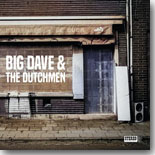 Big
Dave & The Dutchmen are a Belgian-Dutch
blues band who recently released their
self-titled debut release on Naked Records. Led
by David “Big Dave” Reniers (vocals/harmonica),
the band includes Mischa den Haring (guitar),
Roel Spanjers (keyboards), Dusty Ciggaar
(bass/guitar), and Darryl Ciggaar
(drums/percussion). Big
Dave & The Dutchmen are a Belgian-Dutch
blues band who recently released their
self-titled debut release on Naked Records. Led
by David “Big Dave” Reniers (vocals/harmonica),
the band includes Mischa den Haring (guitar),
Roel Spanjers (keyboards), Dusty Ciggaar
(bass/guitar), and Darryl Ciggaar
(drums/percussion).
The
band's musical palette is a mix of traditional
blues of the Chicago and Gulf Coast variety,
along with a bit of gospel and swing. The band
collaborated on nine of the 11 tracks, which
were recorded in just two days in
Antwerp-Hoboken.
The
opener, “Never Love Again,” is a driving shuffle
narrated somberly by Reniers, with nice piano
from Spanjers and tasteful guitar accompaniment.
“I Dig You Baby” is a cool Windy City shuffle
with an absolutely vintage sound. Reniers really
turns loose on harp, and on Billy Bizor's
“Screwdriver,” the band really locks in and
swings behind Big Dave's charismatic vocals and
harp.
“Daring Haring” is a sharply played instrumental
that puts Haring's guitar front and center, with
support from Spanjers on B3. The gospel
standard, “Trouble Of The World,” gets a subdued
treatment with Reniers' solemn vocal and harp,
backed by Spanjer's churchy B3 and piano.
“Lonesome” continues the somber theme, but takes
a slightly more upbeat musical approach, with
some wicked guitar from Haring. “So Sweet” is a
lively shuffle, with Reniers singing the praises
of his baby, and “This Work” has a swampy
southern blues feel. “Never Love Again (Upbeat)”
is an energetic reworking of the opening track,
and one is relieved that they chose to include
both versions on the disc.
“When You Go To Sleep” is a marvelous down home
blues, with superb instrumental performances by
all and a strong vocal from Reniers, and the
closer, “Blues Jump In,” is a tour de force for
Big Dave and his harp, bringing this impressive
debut album to a great conclusion.
Any
fans of a modern take on traditional blues
sounds will be rewarded with Big Dave & The
Dutchmen, a great set from a European band who
knows their way around the blues.
--- Graham Clarke
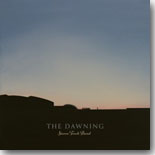 Belgian
harmonica ace Steven Troch has released his
fourth album with the Steven Troch Band.
The Dawning (Naked Records) continues
Troch's innovative approach to the blues,
merging various styles with the music, but still
retaining a firm grasp of the roots with his
harp playing and his insightful songwriting.
Troch is backed by guitarist Matt T. Mahony (Matti
de Rijcke), with Liesbeth Sprangers (bass) and
Dennis de Gier (drums) anchoring down the rhythm
section. Belgian
harmonica ace Steven Troch has released his
fourth album with the Steven Troch Band.
The Dawning (Naked Records) continues
Troch's innovative approach to the blues,
merging various styles with the music, but still
retaining a firm grasp of the roots with his
harp playing and his insightful songwriting.
Troch is backed by guitarist Matt T. Mahony (Matti
de Rijcke), with Liesbeth Sprangers (bass) and
Dennis de Gier (drums) anchoring down the rhythm
section.
The
opener, “Be There For Myself,” has a funky, R&B
vibe with Troch's Motownish harmonica and a pop
-flavored rhythm. “The Mountain” was reviewed
here in February as a single released prior to
the album's release, and it mixes blues, pop,
and reggae influences as Troch warns of reach
exceeding grasp.
“Deleted Scene” is an amusing jazzy blues with a
gritty noir theme, and “Double Down” is a really
cool instrumental, with Troch's harp teaming up
with Tom Eylenbosch on B3 and Mahony on guitar.
The
Americana track “God Pulls The Strings” sounds
like a lost track from an old western movie, and
“On The Road Again” is a fun tune with
entertaining lyrics. Sprangers' deep bassline
opens the funky rocker “Stuff,” which is driven
by a catchy guitar riff and solo from Mahony.
“Wonder Why” is a dreamy blues that's uniquely
loaded with banjo and keyboard dynamics (from
Eylenbosch) and more guitar heroics from Mahony,
making it one of the most memorable tunes on the
album. “Buckriders” is a C&W tune of sorts, a
long-lost theme from a long-lost Western TV
series.
“You
Came Along” is a neat pop-flavored track, while
“The Lottery” sounds like a '50s/'60s pop-jazz
single with the doo-wop backing vocals, the
lilting harmonica solo, and Troch's smooth
vocal. The album concludes with “The Only One,”
revisiting the earlier reggae theme.
The Dawning is an intriguing album with lots
of twists and turns along the way, proving that
the Steven Troch Band is not remotely interested
in standing pat as far as their musical approach
goes. Good news for blues fans who don't like
the same old, same old every time they listen.
--- Graham Clarke
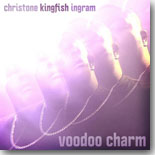 In
late June, Christone “Kingfish” Ingram
announced that he would be releasing a new
album, Hard Road, on his own Red Zero
record label in late September. In advance of
the new album, the Mississippi singer/guitarist
issued a single, “Voodoo Charm.” In
late June, Christone “Kingfish” Ingram
announced that he would be releasing a new
album, Hard Road, on his own Red Zero
record label in late September. In advance of
the new album, the Mississippi singer/guitarist
issued a single, “Voodoo Charm.”
The
new track is a fierce and funky blues with
plenty of Kingfish's trademark soaring fretwork,
backed by his soulful vocals.
It
is certainly a good sign that his
long-anticipated next album will be a monster.
--- Graham Clarke
|